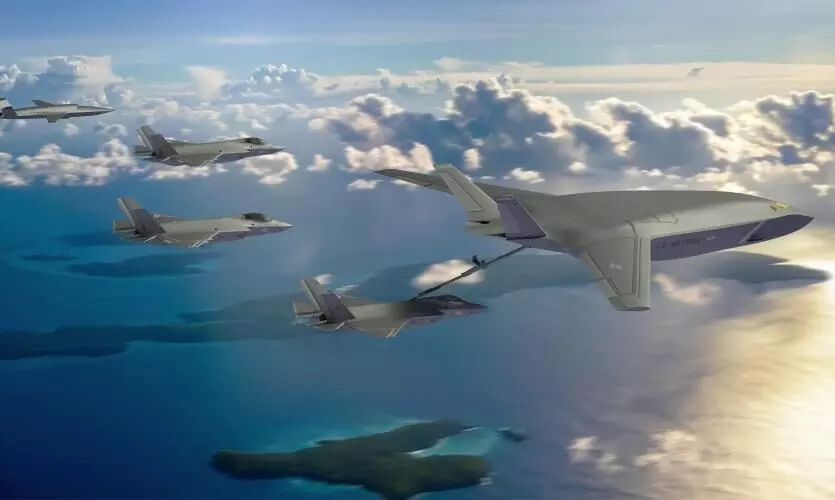
Natilus partners to bid for United States Air Force air-refueling system
Natilus is developing a family of blended-wing-body (BWB) aircraft that enhance aerodynamic efficiency and payload-carrying capacity.

Natilus and a leading defense tech company have partnered to pursue and bid on the United States Air Force Next Generation Air-refueling System (tanker) contract valued at $40B.
The company calls it a proof point on the extensibility of its platform for air cargo – and beyond.
The release reads, “Natilus is also poised to capitalize on the growing threat in the Indo-Pacific region and evolving defense requirements, from aerial refueling to strategic airlift, with the added value of autonomous capabilities.”
Natilus is developing a family of next-generation, blended-wing-body (BWB) aircraft that significantly enhance aerodynamic efficiency and payload-carrying capacity for the commercial freight sector. This will bring a step-function optimization to companies that currently rely on outdated and inefficient modes of transport. It will commoditize air freight.
Unlike traditional tube-and-wing aircraft, which have a distinct cylindrical fuselage and wings, the BWB design integrates the body and wings seamlessly and offers at least a 40% reduction in CO2 emissions. The combination of aerodynamic efficiencies and expanded operational use cases strategically positions the Natilus BWB for both the commercial and defense sector.
Aerodynamic efficiency
The blended-wing-body design significantly reduces drag, making these aircraft more aerodynamically efficient than their conventional counterparts. This reduction in drag translates into decreased fuel consumption of at least 40% and lower operational costs, a critical factor for the military’s budget-conscious operations and need to extend range and capabilities into the Indo-Pacific region.
Increased cargo capacity
One of the standout features of Natilus’ BWB aircraft is the patent-pending, diamond-shaped cargo bay. This configuration can accommodate approximately two and a half times as much cargo as traditional aircraft, making them invaluable for transporting fuel, equipment, and other supplies efficiently. This extra capacity can streamline military logistics and deployment efforts.
Autonomous capability
In partnership with a leading defense technology company, Natilus’ BWB aircraft are not only efficient and capacious but also equipped with cutting-edge autonomous capabilities. This means that these aircraft can operate optionally piloted or without a human crew, extending range and allowing for operations in a contested environment. Autonomous BWB aircraft can be deployed for missions where human pilots’ safety might be at risk, or they can be operated remotely, providing unmatched flexibility in mission execution and scalability.
Blended-Wing-Body defense applications
Aerial refueling missions
Natilus’ autonomous BWB aircraft can serve as highly efficient tanker aircraft, providing fuel to fighter jets, unmanned aircraft, and other military planes while eliminating the need for a human crew in high-risk refueling scenarios. Their enhanced fuel efficiency and larger fuel capacity make them ideal for this role, ensuring that missions can be executed with precision and endurance.
Cargo transportation
Autonomous BWB aircraft offer the same advantages in cargo transportation, with the added benefit of reduced human risk. These aircraft can efficiently transport equipment and supplies with the volume-centric, diamond-shaped cargo bay, ensuring timely deliveries in both conventional and low-infrastructure operational theaters. Where available, Natilus aircraft are also designed to seamlessly integrate with existing infrastructure and operations much like a traditional airplane.
Drone swarm deployment
With its increased payload capacity, a Natilus BWB aircraft is ideally suited for safely carrying and deploying smaller UAVs (uncrewed aerial vehicles) to swarm a contested area. Its larger cargo area means more drones can be launched in one flight to create a larger swarm. With autonomous capabilities, Natilus is the more effective and safe option.
Humanitarian missions
The capabilities of Natilus’ BWB aircraft extend to humanitarian missions as well. In disaster-stricken regions, where access may be limited and conditions hazardous, autonomous aircraft can be deployed for aid and relief delivery, enhancing the USAF’s ability to respond swiftly and effectively to crises worldwide. With the ability to take off and land on shorter runways, this further allows Natilus aircraft to get where others cannot.
Natilus‘ groundbreaking Blended-Wing-Body aircraft, with unrivaled aerodynamic efficiency, increased cargo capacity, and autonomous capabilities, are ready to enhance today’s missions and open doors to new capabilities that will usher in a new era of military aviation. As technology continues to evolve, innovations like the Natilus BWB design will play a pivotal role in ensuring the effectiveness, sustainability, and air superiority of the United States in the 21st century and beyond.

